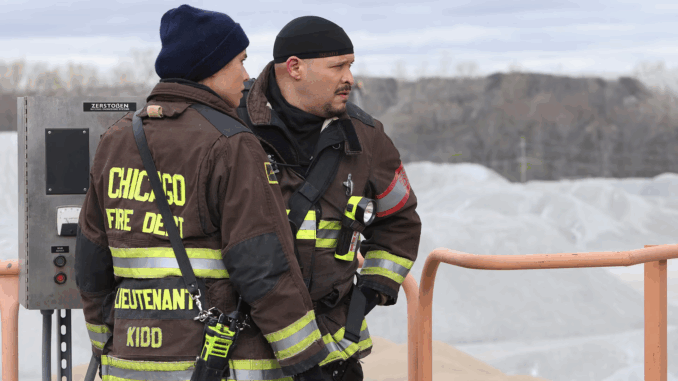
For over a decade, Christopher Herrmann has been the unwavering, passionate, and often hilarious heart of Firehouse 51. Played brilliantly by David Eigenberg, Herrmann is more than just a character; he is the veteran anchor, the man who yells the loudest during calls, the successful co-owner of Molly’s Pub, and the fiercely protective patriarch of his large family and his firehouse “family.” His journey from a cash-strapped, perpetually stressed Lieutenant to a respected Captain—and his recent selfless choice to step back from that rank for Mouch—has been one of the most compelling arcs in Chicago Fire history.
However, as the show enters its latest seasons, with new characters arriving and existing dynamics evolving, the time has come to face a difficult truth: it’s time for Christopher Herrmann to retire. While the thought may sting every longtime fan, retiring the beloved veteran firefighter would be the most respectful, realistic, and narratively fulfilling conclusion to his incredible career.
The Weight of the Badge and the Call of Family
Herrmann’s entire character arc has been defined by the intense conflict between his absolute devotion to the Chicago Fire Department (CFD) and his responsibilities as a husband and father. Unlike Severide or Kidd, who have smaller, though equally complex, family units, Herrmann is the sole provider for Cindy and five children. The sheer physical and psychological risk he takes every shift is magnified exponentially by the weight of that responsibility.
In recent seasons, this conflict has become a prominent storyline. We’ve seen his wife, Cindy Herrmann, face a severe health scare, which forced the family to confront the precariousness of their lives. We’ve also witnessed Herrmann grapple with promotions, repeatedly showing a hesitation to take on a desk-bound leadership role, like Battalion Chief, because his true passion is being “in the trenches” with his crew.
His decision in the Season 13 finale to step down as Captain, despite having earned the rank, to ensure his best friend Mouch could become Lieutenant on Engine 51, was pure Herrmann—a selfless act of loyalty. But it also came at a financial and professional cost, which, for a man with five kids, makes little realistic sense. A dignified retirement would finally allow the character to place his family, and his booming side business, Molly’s Pub, first. He has earned the right to swap the high-risk adrenaline of a fire call for the reliable routine of running a beloved neighborhood bar.
Narrative Over-Saturation and the Next Generation
A television drama, especially one running for over a decade, requires constant renewal. While veteran characters provide necessary grounding, they can also inadvertently stifle the growth of the next generation. Firehouse 51 is stocked with younger, talented firefighters like Darren Ritter, Stella Kidd, and the newest recruits, who need space to develop into the next generation of heroes.
Herrmann’s presence, while comforting, can sometimes make the development of new leadership feel redundant. His recent demotion, while noble, essentially pushes him back into the veteran firefighter role, creating a crowded environment on Engine 51. By retiring, he opens up a coveted spot for a new character or, more importantly, creates a vacuum of wisdom and stability that the younger characters must learn to fill.
Furthermore, a retirement storyline—executed respectfully—offers a poignant narrative opportunity. It would allow for a multi-episode farewell celebrating his career, complete with flashbacks and heartfelt speeches, providing fans with the closure they missed with other abrupt character exits. It’s a chance for the show to hit an emotional high point by honoring a genuine legend of the CFD, rather than waiting for an eventual, and potentially tragic, on-screen death to force the issue.
The Legacy of Molly’s Pub: A Perfect End
One of the greatest arguments for a peaceful retirement is the existence of Molly’s Pub. The bar has always been Herrmann’s other home, his financial safety net, and the true heart of the entire One Chicago franchise. It is the common ground where firefighters, police officers, and doctors mingle, a constant symbol of the city’s community spirit.
Retirement wouldn’t mean a complete exit from the One Chicago universe; it would simply transition his role. Herrmann could become a recurring character, the perpetually grumpy but kind-hearted bartender. We could see him regularly at Molly’s, serving up beers and life advice to Severide, Kidd, Voight, and Halstead. This move would be the perfect way to retain his humor, wisdom, and connection to the main cast without risking his life in dangerous stunts or forcing repetitive, dramatic storylines about his health or finances.
By trading his helmet for a bar towel, Herrmann retains his essential function in the narrative: the glue that holds the community together. He would be an elder statesman, watching over his firehouse family from a safe distance, thereby giving both the character and the actor a less physically demanding, yet equally vital, role.
Conclusion: An Honorable Exit for an Unsung Hero
Christopher Herrmann’s career has been marked by loyalty, selflessness, and a dedication to his crew that borders on legendary. He has passed the torch of command to Captain Kidd and recently sacrificed his own rank for Lieutenant Mouch. His personal story is complete.
For the sake of his health, his beloved Cindy, and his five children, and for the necessary evolution of Chicago Fire itself, it’s time for Captain Christopher Herrmann to hang up his bunker gear. A retirement storyline is not a punishment; it is the most honorable and well-deserved ending for the man who truly is the Heart of Firehouse 51. It would allow the character to live happily ever after—something rarely afforded to a first responder—while keeping his spirit alive at Molly’s, where he truly belongs. The fans may mourn his departure from Engine 51, but they would ultimately cheer for the next chapter of his life, safe and sound, behind the bar.
